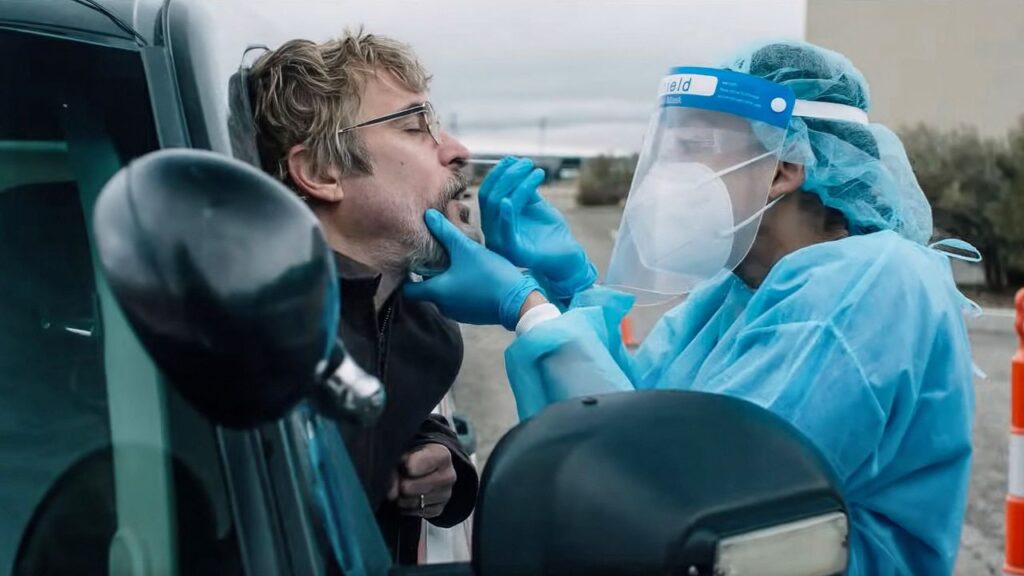Eddington depicts something I’m not sure I’ve ever seen before in a motion picture, and almost certainly not in one that’s opening this weekend on over a thousand movie screens nationwide: A man very obviously suffering from COVID-19 as he goes about his business. Technically, Joe Cross (Joaquin Phoenix), the sheriff of Eddington, New Mexico, has not actually been diagnosed, at least not to his face. Over the course of the movie’s second half, we see him accumulate symptoms, from nagging cough to visible fever and shortness of breath. And we even see him submit to a swab test, which during the movie’s early-summer 2020 timeline is still administered by professionals, at a remote drive-through location. And later we see him ignore messages about his test results, by which point we are already sure that he’s positive, and that each of his many unmasked interactions may be spreading the disease further.
There are, in fact, deadlier things that Joe Cross does over the course of Eddington than spread COVID, even given that the movie takes place in a pre-vaccine, semi-lockdown environment. Though the writer-director is Ari Aster—who made the actual horror movies Hereditary and Midsommar along with the Phoenix-starring and horror-adjacent dark comedy Beau Is Afraid—Eddington is not a pandemic-era horror picture, beyond the ways that anything addressing the summer of 2020 is automatically a horror picture. It is, by turns, a contemporary western and a brain-fog noir, and probably also a satirical comedy, material it comes by in a manner similar to its horrors.
Before Joe actually gets the virus, Phoenix perfectly evokes the kind of guy who felt discomfort over COVID precautions like masking as a matter of poorly articulated principle; he has asthma yet never really mentions that, or anything else, when stumbling through a quietly hardening refusal to wear a face mask. (Less convincing is the first moment of conflict about the masks, which Aster frames as overzealous cops from another jurisdiction demanding that Joe wear one while alone in his vehicle. I’m not sure if I ever saw a cop wearing a mask actually covering their nose, let alone angrily scolding another officer over the practice.) It all just somehow doesn’t sit right with him. The virus isn’t really in Eddington, he reasons, and the endless scroll of social media has clearly taken its toll as he watches in dismay as Black Lives Matter protests roil the country—something that, like COVID precautions, he doesn’t consider “bad,” per se, so much as not particularly applying to him or his. Social media is also doing something to Joe’s oft-bedridden wife Louise (Emma Stone) and her mother Dawn (Deirdre O’Connell), though their respective interests in various video-peddled conspiracy theories seem to be drifting further apart, from each other as well as from Joe.
Though no one says so directly, it feels like Joe’s relative isolation—though he continues to operate the sheriff’s department in person, with a pair of deputies—is what allows him to impulsively announce that he’s running for mayor, challenging the more progressive (but also Big Tech-friendlier) incumbent Ted Garcia (Pedro Pascal). Meanwhile, some local teenagers, including Ted’s son, jostle over lockdowns, bringing BLM protests to Eddington.
For a while, Eddington seems poised to serve as an omnidirectional satire in the style of early Alexander Payne, where messy political stances stem from everyone’s individual self-delusions. Aster lines up an ensemble of interconnected characters, none completely pure of motivation or intention yet none fully caricatured either. (Well, maybe the burgeoning cult leader played by Austin Butler, but it’s hard to tell what exactly he’s a caricature of.) Ultimately, though, Aster approaches satire much as he does horror—with a boldness that sometimes turns to bluntness, laced with hints that he doesn’t know exactly what he’s wielding or why. His movies are the work of an artist not fully in control of his own artistic faculties; as Eddington goes on, and on, its scope and violence increases while many of its supporting characters recede or shrivel, and the narrative grows increasingly inscrutable. The story becomes lopsided toward Phoenix and his congested murmuring. Call it Joe Is Afraid (And He’s Gonna Do Something About It).


